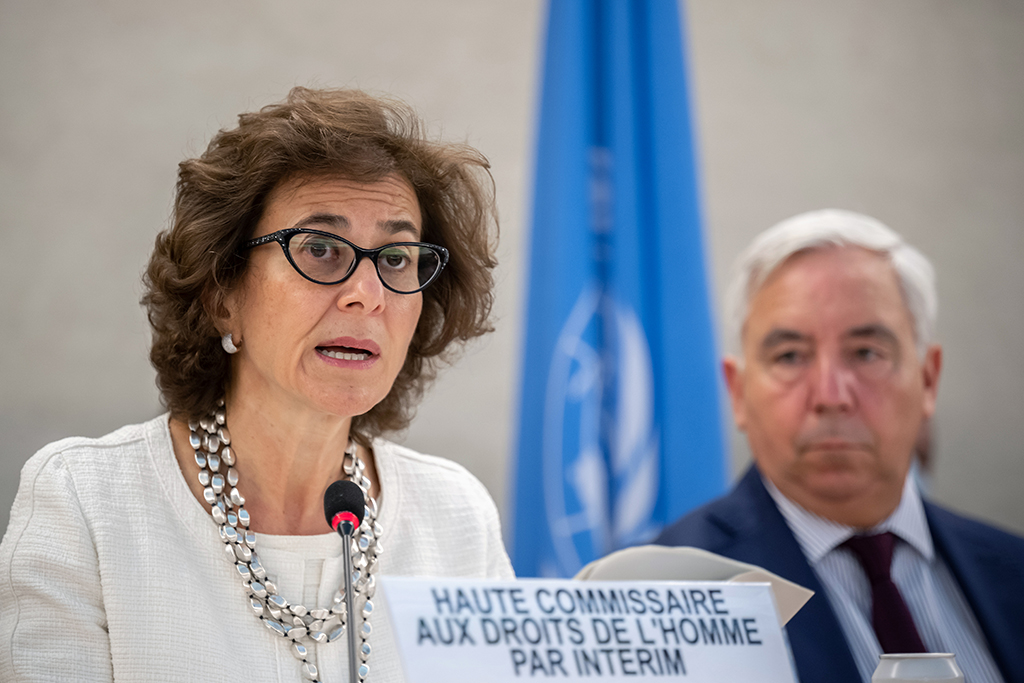GENEVA, Switzerland: The United Nations on Monday condemned Moscow's "intimidation" of people in Russia opposed to its war in Ukraine, warning it was undermining fundamental freedoms. Speaking before the UN Human Rights Council, deputy UN rights chief Nada Al-Nashif decried the "intimidation, restrictive measures and sanctions against people (in Russia) voicing opposition to the war in Ukraine".
These actions, she warned, "undermine the exercise of constitutionally guaranteed fundamental freedoms, including the rights to free assembly, expression and association". Nashif, who is serving as acting High Commissioner for Human Rights until new chief Volker Turk replaces Michelle Bachelet, was speaking at the opening of the rights council's 51st session, which runs until October 7.
Nashif listed concerns about rights in a range of countries. But she took unusually harsh aim at Moscow. She decried "pressure against journalists, blocking of internet resources and other forms of censorship", saying such actions were "incompatible with media pluralism and violate the right to access information".
"We urge the Russian Federation to reconsider measures taken to expand the 'foreign agent' label to include individuals considered to be 'under foreign influence'", she said. She also called on the Kremlin to refrain from criminalising "undeclared contacts with representatives of states, foreign or international organisations deemed to be directed against the 'security' of the Russian Federation".
'Censorship'
Moscow left the rights council in April after it was suspended from the body over its invasion of Ukraine. But it remains an observer and could still speak up when countries debate Nashif's remarks on Tuesday. Earlier this year, the council ordered a high-level probe into violations by Russian troops in Ukraine. The investigators are due to report back on September 23. There has been growing pressure for the council to also turn its gaze on rights abuses inside Russia itself.
Rights groups want the council to appoint a special rapporteur to examine the situation, but so far no countries have agreed to take a lead on such a resolution. Western countries are wary of what the impact would be if a vote on the issue failed to garner enough support within the 47-member council.
"Everyone agrees there is a need... but what we haven't agreed on is timing," one Western diplomat said. "The impact of a defeated resolution would be felt for a long time," a European diplomat agreed. The UN rights body also seems paralysed by uncertainty on how to respond to allegations of serious violations in China.
China in focus
China is facing intense scrutiny since outgoing rights commissioner Bachelet released a long-delayed report last week on China's Xinjiang province. The report said China may have committed crimes against humanity. It added UN weight to allegations by campaigners of a litany of abuses in Xinjiang, where they say more than one million Uyghurs and other Muslims have been detained. Beijing vehemently rejects the charges.
Western countries and their allies appear to agree action in the UN rights council is warranted. Rights groups are urging them to condemn the alleged violations or even order an investigation. But fears abound that a failed attempt at action would signal a shifting power balance and weaken the council. China has meanwhile been energetically lobbying countries behind the scenes to "pre-emptively" counter any moves, observers say.
"We are ready to conduct business in a constructive way but if anybody launches joint actions against us, we have to be fully prepared," the Chinese ambassador to the UN in Geneva, Chen Xu, told reporters last week. - AFP











